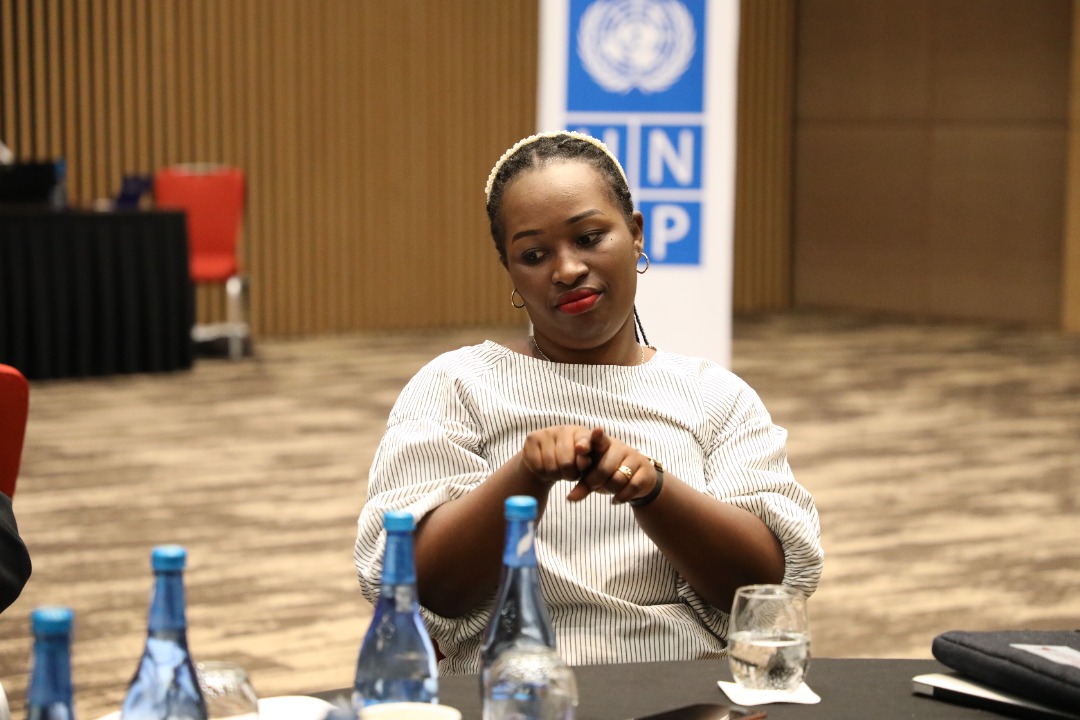By Stella Tushabe
UNDP Rwanda Launches Multi-stakeholder Disability Platform
November 30, 2022

A volunteer interprets the dialogue into sign language at the Multi-stakeholder Disability Platform Launch
UNDP Rwanda Launches Multi-stakeholder Disability Platform
30/November/2022 - In an exciting collaboration with the Ministry of Local Governance, NCPD Rwanda, UNICEF, and UN Women in Rwanda, UNDP Rwanda has launched a groundbreaking multi-stakeholder disability platform ahead of the International Day for Persons with Disabilities (IDPwD). This platform couldn't have come at a more perfect time, as it aligns with the mission of IDPwD to advocate for the rights and needs of individuals with disabilities. The theme for this year's celebration is "Transformative solutions for inclusive development: the role of innovation in fuelling an accessible and equitable world."
The launch of this forum aims to bring together an incredible array of stakeholders, including members of the disability community, government representatives, Civil Society Organizations, and private sector leaders, to engage in meaningful discussions on how Rwanda can become a more inclusive country. The objectives of the platform are to foster coordination, information sharing, networking, and resource mobilization among all participants. A recent situation analysis by UNDP in 2021 revealed a lack of stakeholder coordination in disability inclusion, making the launch of this platform all the more critical. The platform also aims to facilitate improvements in disability inclusion through research, capacity building, and forging partnerships with other organizations to enhance information sharing.
Maxwell Gomera, the Resident Representative of UNDP Rwanda, emphasized the significance of combating negative attitudes within social circles, which often present the greatest barriers to inclusion and career advancement. Gomera believes that simple measures like leveraging social media to promote messages supporting Persons with Disabilities can make a substantial impact.
The event featured esteemed speakers from across Rwanda, including representatives from the Ministry of Local Governance. Assumpta Ingabire, the Minister of State in Social Affairs, expressed gratitude for UNDP Rwanda's noble initiative and highlighted the Rwandan government's commitment to uplifting those living in extreme poverty. She recognized that the disability platform would contribute to achieving more sustainable results by fostering collaboration.
The platform's ultimate goal is to serve as an engaging platform that brings together stakeholders to enhance the quality of life for people with disabilities. Rwanda has emerged as a trailblazer in disability inclusion and development, setting an example for other nations and positively impacting the lives of individuals with disabilities.
During the event, a panel discussion provided a platform for individuals with different disabilities to share their expectations for the platform with government and Civil Society stakeholders. Baptiste Murema, Legal Advisor and Program Manager at the National Union of Disabilities' Organisations of Rwanda (NUDOR), emphasized the necessity of changing mindsets, particularly among decision-makers, for true disability inclusion to take place. He also stressed the importance of creating awareness and conducting research on the lives of persons with disabilities to make informed decisions.
Sam Munana, the Executive Director of the Rwanda National Union of the Deaf (RNUD), emphasized the need for full representation of persons with disabilities in the planning and implementation phases of policies that affect them. He also highlighted the importance of considering user experience when designing assistive devices.
Aligned with this year's IDPWD theme, "Transformative solutions for inclusive development: the role of innovation in fuelling an accessible and equitable world," the event unveiled five enhanced white canes. These smart white canes, designed by innovative Rwandan entrepreneurs at Polystar Nanotech Ltd, are rechargeable, customizable to different heights, and provide vibration and signaling alerts when users encounter obstacles in front or above them, significantly improving mobility. Additionally, the canes feature wheels for easier use on various surfaces.
In another exciting development, UNDP recently introduced a 3D computer-aided design and manufacturing machine for orthotics and prosthetics. This advancement will greatly enhance the efficiency and quality of prosthetic limbs produced, ultimately improving the lives of individuals who rely on them.
UNDP remains committed to collaborating with diverse organizations to empower persons with disabilities, supporting their journey towards self-reliance and independence.

 Locations
Locations

